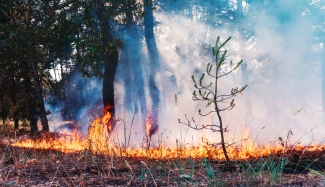Using the bioeconomy to prevent forest fires

Move beyond an extinction-based approach to forest fires and focus on prevention, via the bioeconomy.
This was the message from the ThinkForest event held in Madrid on 29 May, which gathered policymakers, scientists and practitioners to discuss the issue of forest fires in the Mediterranean region.
“As a society we need to be deeply committed to facing this problem with all the tools we have, including the bioeconomy” said Esperanza Orellana, General Director, Spanish Ministry of Agriculture and Fisheries, Food and Environment. She called for a move to a long-term, proactive approach to preventing forest fires, which focused on forest management.
This was echoed by practitioner Marc Castellnou, strategic fire analyst with the Regional Fire Services in Catalonia, Spain. “A better landscape, a better forest” is needed, he said, rather than more firefighters or more planes. Forest management would make the difference, and help fire services to do their job better.
The critical factor, and one of the reasons for lack of forest management is the lack of value that people place on forests. We need to create wealth with forests, create awareness, responsibility and culture. Here the bioeconomy is key. Inazio Martinez de Arano, Head of EFI’s Mediterranean Facility laid out some practical steps. “The bioeconomy provides a way to take forests from a sink of public resources to a source of richness. There are thousands of opportunities, including construction, aeronautics, textiles, resins, agrochemicals, cosmetics”, he said. We should make the best use of existing instruments and sectoral policies, such as the EU CAP, to foster innovation and connect value chains.
Panel discussions explored the lessons learned and their policy implications in Italy, Spain and Portugal. The panel agreed that the support of local communities is vital to creating value in the forest - if private owners feel that forests can be a source of income, forest management will improve. Financial incentives are needed, but experience shows this could be difficult, especially when there is lack of information about the private forest owners.
Finally, creating a forest culture and narrative is important: we need to change mindsets and engage citizens in their landscape.
More information
The ThinkForest science-policy seminar, ‘The role of the bioeconomy in controlling forest fires’ was held in Madrid on 29 May.
Further information: Lauri Hetemäki, Assistant Director, European Forest Institute, e-mail: lauri.hetemaki @ efi.int or phone: +358 (0)10 773 4316
More information about forest fires and the role bioeconomy can play in controlling them can be found in EFI’s infographic video: Fighting catastrophic forest fires: a new vision


